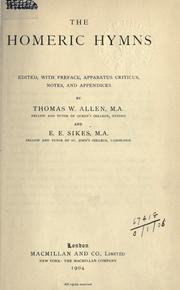

C ssola's edition, is equipped with an apparatus of formulaic parallels in archaic hexameter poetry as well as possible verbal echoes in later literature. How is the relationship between Apollo and his mother Leto developed in the first fifteen lines of the hymn What is your view of such a mother/son divine. It is preceded by a detailed introduction that addresses the Hymn's ideas on poetry and music, the poem's humour, the Hymn's relation to other archaic hexameter literature both in thematic and technical aspects, the poem's reception in later literature, its structure, the issue of its date and place of composition, and the question of its transmission.

The commentary pays special attention to linguistic, philological, and interpretive matters. This book provides the first detailed commentary devoted specifically to this unusual poem since Radermacher's 1931 edition. This hymn describes the birth and origins of the sun god Apollo, born to the minor goddess Leto after being impregnated by Zeus. In just 580 lines, the newborn god invents the lyre and sings a hymn to himself, travels from Cyllene to Pieria to steal Apollo's cattle, organizes a feast at the river Alpheios where he serves the meat of two of the stolen animals, cunningly defends his innocence, and is finally reconciled to Apollo, to whom he gives the lyre in exchange for the cattle. Hymn to Apollo Peter Bing Emory University Towards the end of the Delian section of the Homeric Hymn to Apollo, as the climactic event in his description of the great Ionian festival, the blind singer of Chios presents what he calls 'a great wonder, whose fame shall never perish' (gFya Oaxi4cx, oov KiXoq otirot 0,itcct, 156). The Hymn to Hermes, while surely the most amusing of the so-called Homeric Hymns, also presents an array of challenging problems.


 0 kommentar(er)
0 kommentar(er)
